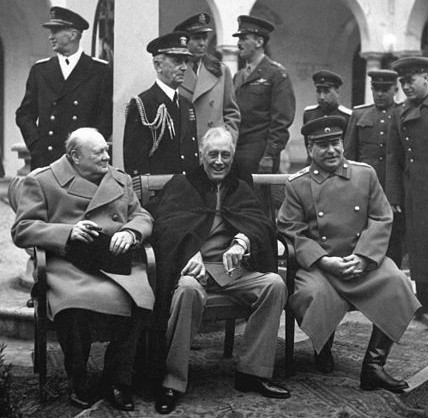With the German Army on the run after the Battle of the Bulge, leaders of the Allied Powers met at Yalta on the coast of the Black Sea to lay out a plan for post-war Europe on February 4, 1945. As British Prime Minister Winston Churchill, President of the United States Franklin D. Roosevelt and Soviet Premier Joseph Stalin sat down at the Livadia Palace in the Crimea, the course to victory in Europe and Asia — and, in many ways, the foundation for the Cold War — would be created. Near the end of 1944, Adolf Hitler and Nazi leadership were in search of a means to turn the tide along the Western Front. Since the D-Day assault the previous June, Allied armies quickly advanced from the coast in Normandy and pinned the Germans back close to their pre-war western borders. In mid-December, Hitler activated a plan to force a breakthrough in the hopes it might put pressure on the British and Americans to surrender and negotiate a truce separate from the Russians. With this victory achieved, Nazi strategists believed they would be able to turn the full might of their military to the Eastern Front and conquer the Soviet Union. The move failed. Allied resistance held firm at the Battle of the Bulge and repelled the German attack by the end of January 1945. Hitler’s soldiers were soon retreating through the Ardennes forest once again, if not surrendering in large numbers, leaving the Western and Eastern Fronts collapsing rapidly. The Red Army, under Marshal Georgy Zhukov had already made it within 40 miles of Berlin. With triumph over the Nazi scourge within their grasp, the “Big Three” met in Yalta on February 4, 1945. Each man brought his own policy initiatives to the summit, attempting to shape the world beyond Germany. Stalin, believing his negotiating position the strongest considering his army’s size and proximity to the heart of Hitler’s homeland, attempted to force the discussion toward massive reparations following an unconditional surrender. Churchill, holding a deep distrust of the Soviet Premier, asked for free and democratic elections in Poland. Roosevelt, near the end of his life after a long battle with polio, hoped to draw the Russians into the Pacific Theater to defeat Japan. Negotiations were tense, with both sides hardly willing to give ground. The face-to-face discussions served as a preview of the Cold War to come: Stalin insisted upon retaining territories under communist control and Churchill, in particular, attempted to draw a line ensuring the people of Lithuania, Romania and other countries in Eastern Europe would be able to decide their own fate. (Stalin ended up guaranteeing them the opportunity, then stalled on following through after V-E Day.) By the end of the conference, Roosevelt, Churchill and Stalin came to a conclusion on the shape of the new Germany: four zones would be supervised by Soviet, British, American and French administrators and a portion of the eastern provinces would be returned to Poland. In addition, the Soviet Union would enter the United Nations and fight alongside the Americans against Japan three months after the end of combat in Europe. The US and Britain walked away satisfied, with Churchill saying, “Poor Neville Chamberlain believed he could trust Hitler. He was wrong. But I don’t think I’m wrong about Stalin.” History would prove the British Prime Minister’s confidence to be unfounded. Stalin installed a Communist government in Poland, giving the appearance the Poles were abandoned by the Allies to observers throughout Europe. By the end of March, the Soviet Premier’s ruthless plan to create an Eastern Bloc in Europe was well underway. Poland, Hungary, Czechoslovakia, Romania, Bulgaria, Albania and East Germany were all run by Communist governments in 1949, often thanks to dubious elections. Roosevelt died two weeks after Yalta and Churchill was soon replaced by Clement Atlee as Prime Minister after a comprehensive defeat in the 1945 elections. Criticism over the outcomes of the conference and the inability to force Soviet concessions during the negotiations continues to haunt both men’s legacies today. Also On This Day: 1789 – George Washington is unanimously elected the first President of the United States by the Electoral College 1846 – Mormon pioneers leave Illinois to establish Utah Territory 1859 – The Codex Sinaiticus, one of the best historical translations of the Old and New Testament of the Christianity’s Bible, is discovered in Egypt 1936 – Radium, the first manmade radioactive element, is created in a lab at the University of California-Berkeley 1997 – Serbian President Slobodan Milosevic recognizes the victory by his challenger in the November 1996 elections You may also like : February 4 1789 – George Washington is unanimously elected the first President of the United States by the Electoral College
February 4 1945 – Winston Churchill, Franklin D. Roosevelt and Joseph Stalin Gather for the Yalta Conference
With the German Army on the run after the Battle of the Bulge, leaders of the Allied Powers met at Yalta on the coast of the Black Sea to lay…
373
